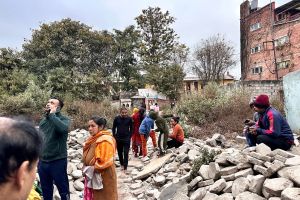Millions Affected, Displaced By East India Flood
Up to five million people have been affected by severe flooding in a northeastern Indian state after the infamous Kosi River changed its course and flooded areas not normally prone to flooding.
Rescuers have been evacuating people on rescue boats in the impoverished Bihar state since mid-August when the so-called "river of sorrow" broke through flood walls and overflowed into farmland, according to Agence France-Presse.
Some 900,000 people are reported to have abandoned their homes or been evacuated by rescue boats. And an area the size of Hong Kong now lies underwater in east India.
In neighboring Nepal, some 60,000 people are said to be homeless, and at least 100,000 are trapped on rooftops and small strips of dry land, officials say.
Bihar officials are converting all available buildings - such as schools, temple, and study housing - into temporary shelters.
"Private people are helping us, but the government is not helping us," complained Mithilesh Yadav, 30, who left his village on a rescue boat with his wife and five children last Wednesday, according to AFP.
"The schools, the camps, everything is full. We have put up these huts ourselves. We have to live somehow."
Besides shelter, another problem facing flood victims is access to food.
A correspondent of Gospel for Asia, a ministry that works in South Asia, said that rice is selling for four to five times its usual price. And even when people manage to secure a little rice, they usually eat it raw because there is no clean water to cook it with.
Flood victims also are in danger of water-borne diseases.
Relief organizations are on the ground helping flood victims by setting up soup kitchens wherever it's possible.
"The government machinery and everyone have been moving around the clock," said Aditi Kapur, a spokeswoman for British aid group Oxfam, which has workers in the badly-affected Supaul area.
"At the same time there are still people in remote areas who are waiting for relief. Shelters are cramped and unhygienic. There are pregnant and lactating women who need safe drinking water. These things are not there."
The water is receding in some areas, but officials warn that there is still about a month left before the end of India's deadly monsoon season.
"Please pray that the waters will recede soon so our GFA Compassion Services teams can begin meeting the physical and spiritual needs of the people as soon as possible," said GFA president K.P. Yohannan.





























